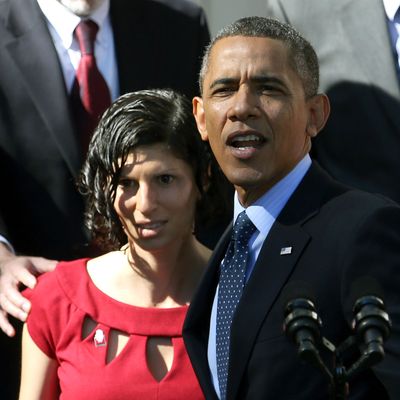
Dean Angstadt, a 57-year-old, self-employed logger, said that the Affordable Care Act saved his life. He was unemployed when a faulty aortic valve necessitated heart surgery. His plan kicked in, and he had the surgery just days later.
Kathy Bentzoni, a 58-year-old Pennsylvanian, is also thankful for Obamacare. Just after she got coverage, doctors discovered that she had a rare blood disorder. Without the law, she said, she would be “probably dead.”
Joshua Haymore, a 27-year-old Coloradan, could not get a specialist to see him for weeks last year while he was uninsured, and his ulcerative colitis worsened to the point that he nearly died, his mother told me. His family ended up paying up to $800 a month for drugs to keep the condition in check. Now that he has Medicaid, his prescriptions cost $3 and his health has improved significantly.
Those are just three of thousands of good-news stories coming from the insurance expansion in the Affordable Care Act. Across the country, the law is improving access to doctors, prompting low- and middle-income Americans to use more medical care, protecting families from financial distress and ultimately saving lives — as many as 24,000 a year, back-of-the-envelope math suggests.
Those are exactly the sort of life-saving and life-changing outcomes that Democrats have eagerly awaited since the law was signed nearly five years ago, outcomes that might brighten the public’s perception of the Affordable Care Act after years of unremitting Republic attacks.
Finally, President Obama has gotten to describe the law in personal and moral terms, rather than as a dry, numbers-and-bullet-points policy. “Those who have based their entire political agenda on repealing it have to explain to the country why Jeanne should go back to being uninsured. They should explain why Sean and his family should go back to paying thousands and thousands of dollars more. They’ve got to explain why Marla doesn’t deserve to feel like she’s got value,” he thundered this spring.
But there is scant evidence that Americans have started to take notice, or care. More than half of the country has an unfavorable view of Obamacare, a proportion that has been rising of late. The Democrats who passed the law are generally avoiding discussing it this election cycle: “We’re not running on or from the Affordable Care Act,” House Minority Leader Nancy Pelosi told the website Vox. Republicans, for their part, continue to howl for its repeal and focus on its downsides, including its trillion-dollar price tag.
Is it just a matter of time? A year or five from now, might large numbers of Americans think of the Affordable Care Act as lifesaving, not just complicated or costly or intrusive? Might there eventually be an Obamacare dividend?
To all those questions, there is a good chance that the answer is no.
The Affordable Care Act is a law with huge costs and huge benefits — and its costs started to pile up years before its benefits did. President Obama signed the law on March 23, 2010. But to give the government and businesses time to prepare for the biggest expansion of the welfare state since the Great Society, its main coverage provisions did not kick in until January 1, 2014.
Over that time, the unpopular law never became popular. Its story was a story of government mandates and intrusion and ineptitude and costs. Republicans forced more than 50 House votes to repeal or kneecap the law. Court cases and business complaints piled up. The White House horrifically bungled the website that millions of families needed to use to get subsidized insurance.
Media coverage and personal conversations about the law skewed negative during that time, too. Of late, only about half of poll respondents said they have talked about Obamacare with friends and family — and people were four times more likely to say they heard bad things than good things. Individuals report seeing far more negative political advertisements about Obamacare than positive political advertisements, as backed up by independent studies of what is on the air.
On top of that, the Obama administration failed to explain the content of the law to Americans. Even now, with Obamacare nearly in full force, misconceptions abound. In a recent poll by the Henry J. Kaiser Family Foundation, about one in four respondents thought Obamacare was a government health plan. (It is not: About half of new enrollees have Medicaid and half have subsidized private plans.)
At the same time the major insurance expansion hit, making it easier for millions of families to make a doctor’s appointment, or pay for prescription medication, or get a necessary surgery, Americans were mostly feeling confused and negative about Obamacare.
It will be years before economists, doctors, and health researchers have good measures of the impact of Obamacare on the country’s financial and physical health. But two state studies are at least suggestive of the effect the Affordable Care Act might have.
One is the famed Oregon Health Insurance Experiment. In the study, some poor, uninsured adults won access to Oregon’s Medicaid program; many others did not. In follow-up examinations and surveys, there was little evidence that insurance made anybody healthier in the short term, at least when it came to a few common conditions like hypertension and diabetes. But it had a powerful effect on rates of depression and measures of financial stability.
Even so, researchers and doctors do think that insurance might make at least some Americans healthier, and will pull down mortality rates in aggregate: Insurance is not health care, but it does change how Americans access health care and how much health care they can access.
Consider Joshua Haymore, who has a developmental disability and works as a grocery bagger for the state minimum wage. Last spring, he started experiencing severe stomach cramps and bloody diarrhea. Eating was excruciating. His mother, Susan, tried giving him over-the-counter medications. But she became increasingly alarmed as the pounds slipped off of him and the pain failed to subside.

Their options were limited, Susan said, by Joshua’s lack of insurance. Some specialists turned him away; others refused Susan’s offer to pay for a visit and tests in cash. In the meantime, Joshua’s condition worsened to the point that he contemplated suicide. “He was in so much pain, he said, ‘I just want to die. I don’t want to live.’ He was at a point where he couldn’t take the pain anymore,” Susan told me.
By the time a physician finally saw and diagnosed him, Joshua had lost 30 pounds. “The doctor said it was the worst case of ulcerative colitis he had ever seen,” said Susan. All five feet of his colon were damaged. Had he come in just a few days later, the doctor told her, “Joshua would not have made it. He would have died.”
Ultimately, Joshua did get treatment even though he was uninsured. But it was costly and inefficient, and came too late to save him from weeks of pain and physical deterioration. Susan said the Medicaid expansion had helped Joshua significantly since it kicked in. “One of the things with ulcerative colitis is that stress causes it to flare up,” she said. “He was under a lot of stress. Last year, he told me he was having nightmares that I wouldn’t be able to pay for his medication.” Now his pills cost only few dollars a month.
The aggregate effect of thousands of such stories might be a lower mortality rate, as demonstrated by a powerful study of Romneycare, Massachusetts’s 2006 universal-coverage law. Researchers found that the law nudged the annual mortality rate down 2.9 percent. In a given year, universal insurance saved one life for every 830 people newly covered. If Obamacare were to have a similar effect to Romneycare — the law it was in part modeled on — it might save as many as 24,000 lives a year.
Staffers in the White House have long privately held that the Affordable Care Act could be a potent political cudgel for Democrats because of those 24,000 lives saved — and the millions more households benefiting in less-dramatic ways, with smaller medical bills, no fear of losing coverage, no concerns about being excluded for their preexisting conditions, no worries about how to pay for prescriptions, no problems arranging an appointment with a high-cost specialist.
“I don’t think we should apologize for it,” President Obama said at a news briefing this spring. “I don’t think we should be defensive about it. I think there is a strong, good, right story to tell.” That story can now be told, through the Haymores and millions of other families.
But there are no signs that the good news starting to accumulate has changed anyone’s mind — at least not yet. American opinion on the law has hardened rather than softened as of late. According to Gallup, “There is no sign that Americans think the new healthcare law is having a net positive effect on their health care situations. The majority say the law has not affected them, while those who do report it having an effect are more likely to say it has hurt their health care situation rather than helped it.”
Why? One major reason is that nobody has “Obamacare,” a point made by the political scientist Jonathan Bernstein and others. People like Joshua have Medicaid. Others have subsidized private insurance purchased through a state exchange, like Kynect or the Arkansas Health Connector. Even those who went through the federal site to obtain insurance never saw the phrases “Affordable Care Act” or “Obamacare,” Bernstein points out. As such, anecdotes about the newly uninsured failing to understand it was Obamacare that got them insurance abound.
Obama himself has referenced the fact that many still don’t know what’s in the law. He ticked off a laundry list of provisions at a speech in April. “These are all benefits that have been taking place for a whole lot of families out there, many who don’t realize that they’ve received these benefits,” he added.
There’s statistical evidence that confusion about Obamacare continues to dampen support for the law, too. Surveys continue to find that the Medicaid expansion is more popular than the Affordable Care Act. The subsidies to help families buy health insurance are more popular than the Affordable Care Act. The provision allowing children to stay on their parents’ insurance plans for longer is more popular than the Affordable Care Act. Even Republicans support the major coverage provisions of the law — just not the law itself. “If the public had perfect understanding of the elements that we examined, the proportion of Americans who favor the bill might increase from the current level of 32 percent to 70 percent,” one team of researchers found.
In time, might narratives such as Joshua’s help erode some of the negativity about the law, cementing its upsides and helping make its benefits clearer to understand? Perhaps. But the widespread, negative feelings about the law might create a vicious dynamic: Many vulnerable Democrats have avoided running on the law because of its unpopularity, therefore forgoing any chance to talk about the law’s benefits and bolster its popularity. And some of those that are running on the law are often focusing on its popular component parts, rather than its unpopular whole.
What seems far more likely is that Americans will continue to support provisions of Obamacare without ever supporting Obamacare — even if the law does save tens of thousands of lives a year.





























